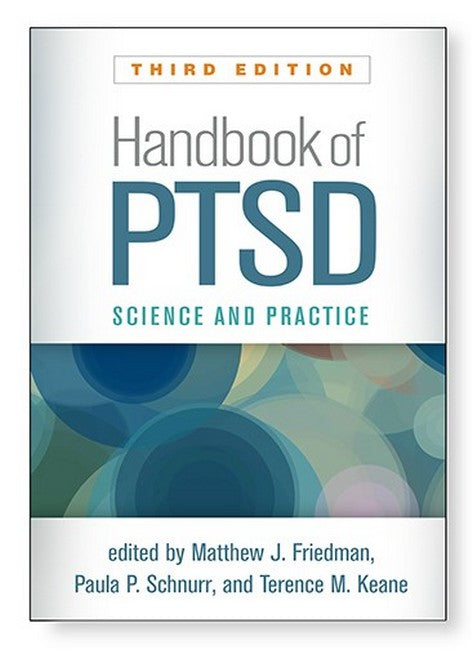Description
I. Historical Overview: Setting the Context
1. PTSD from DSM-III to DSM-5: Progress and Challenges, Matthew J. Friedman, Paula P. Schnurr, & Terence M. Keane
2. DSM-5 Criteria for PTSD, Matthew J. Friedman, Michelle J. Bovin, & Frank W. Weathers
3. Historical Roots of the PTSD Construct: How PTSD Became a Diagnosis and Launched the Traumatic Stress Field, Alexander C. McFarlane & Dean G. Kilpatrick
II. Scientific Foundations and Theoretical Perspectives
4. Epidemiology of Trauma and PTSD in Adults, Kristina J. Korte, Tammy Jiang, Karestan C. Koenen, Sandro Galea, & Jaimie L. Gradus
5. Epidemiology of Trauma and PTSD in Childhood and Adolescence, William E. Copeland & Ellen W. McGinnis
6. Psychological Models of PTSD, Richard A. Bryant
7. Alterations in Memory and Other Neurocognitive Processes, Chris R. Brewin & Jennifer J. Vasterling
8. Trauma-Induced Dissociation, Anne P. DePrince Martin J. Dorahy, Ruth Lanius, & Francesca L. Schiavone
9. Examining Neurocircuitry and Neuroplasticity in PTSD, Lynnette A. Averill, Christopher L. Averill, Teddy J. Akiki, & Chadi G. Abdallah
10. Neurochemistry, Neuroendocrinology, and Neuroimmunology of PTSD, Ann M. Rasmusson, Byung K. Kim, Tiffany R. Lago, Kayla Brown, Caitlin Ridgewell, & Arieh Y. Shalev
11. Genetics of PTSD, Daniel Bustamante, Kaitlin Bountress, Christina Sheerin, Karestan C. Koenen, Guia Guffanti, Lulu Yan, Michelle Haloossim, Monica Uddin, Nicole Nugent, & Ananda B. Amstadter
12. What Brain Tissue Can Tell Us: Postmortem Brain Banking and Analysis of PTSD Molecular Pathology, Matthew J. Girgenti, Bertrand R. Huber, Matthew J. Friedman, & Ronald S. Duman
13. Gender Issues in PTSD, Rachel Kimerling, Julie C. Weitlauf, & Amy E. Street
14. A Developmental Perspective on Childhood Traumatic Stress, Adam D. Brown, Emily Becker-Weidman, & Glenn N. Saxe
15. Trauma and PTSD in Older Adults, Joan Cook & Vanessa Simiola
III. Clinical Practice: Evidence-Based State of the Art
16. Assessment of PTSD and Its Comorbidities in Adults, Nicholas A. Livingston, Deborah J. Brief, Mark W. Miller, & Terence M. Keane
17. Assessment of PTSD in Children and Adolescents, Ernestine C. Briggs, Kate Nooner, & Lisa M. Amaya-Jackson
18. Early Intervention Following Trauma, Alvi Azad, Leonard Skipper, Gary H. Wynn, & David M. Benedek
19. Psychosocial Treatments for Adults With PTSD, Tara E. Galovski, Carmen P. McLean, C. Adrian Davis, & Jennifer S. Wachen
20. Psychosocial Treatments for Children and Adolescents with PTSD, Judith A. Cohen & Anthony P. Mannarino
21. Empirically Supported Couple and Family Therapies for PTSD, Candice M. Monson, Alexandra Macdonald, Steffany J. Fredman, Jeremiah A. Schumm, & Casey Taft
22. Group Treatments for PTSD, J. Gayle Beck & Denise Sloan
23. Pharmacotherapy for PTSD, Lori Davis, Patricia Pilkinton, & Garrett Aikens
24. Treating PTSD When Common Comorbid Disorders Are Present, Sonya B. Norman, Elizabeth Straus, Robert C. Lyons, Laura D. Crocker, Peter J. Colvonen, & Jessica C. Tripp
25. Trauma Exposure, PTSD, and Physical Health, Paula P. Schnurr, Jennifer S. Wachen, Bonnie L. Green, & Stacey Kaltman
IV. Emerging Territory
26. Culture, Trauma, and Traumatic Stress amongst Refugees, Asylum Seekers, and Postconflict Populations, Derrick Silove & Louis Klein
27. PTSD and the Law: Forensic Considerations, Dean G. Kilpatrick, Alexander C. McFarlane, & Lucy A. Guarnera
28. Technology-Based Interventions, Josef I. Ruzek
29. Treating PTSD Using Telemental Health Technology, Leslie A. Morland, Lisa H. Glassman, Carolyn J. Greene, Julia E. Hoffman, & Craig Rosen
30. Psychoneurobiology of Resilience, Lynnette A. Averill, Christopher L. Averill, Robert H. Pietrzak, Dennis S. Charney, & Steven M. Southwick
31. Public Mental Health Interventions Following Disasters, Joshua C. Morganstein, Holly B. Herberman Mash, Mary C. Vance, Carol S. Fullerton, & Robert J. Ursano
32. Dissemination and Implementation of Best Practices in Prevention and Treatment of PTSD, Shannon Wiltsey Stirman
33. Key Questions and an Agenda for Future Research, Matthew J. Friedman, Paula P. Schnurr, & Terence M. Keane
Matthew J. Friedman, MD, PhD, is Senior Advisor to the National Center for PTSD, where he served for 24 years as Executive Director; founder and Director of the National PTSD Brain Bank; and Professor and Vice Chair for Research in the Department of Psychiatry at the Geisel School of Medicine at Dartmouth. Dr. Friedman has worked as a clinician and researcher since the 1970s, and has approximately 350 publications, including 28 books. He is past president of the International Society for Traumatic Stress Studies and past chair of the American Psychiatric Associations DSM-5 and DSM-IV-TR PTSD Work Groups. He has served on numerous national research, education, and policy committees and has received many honors for his leadership and contributions to the field. Paula P. Schnurr, PhD, is cofounder and Executive Director of the National Center for PTSD and Professor of Psychiatry at the Geisel School of Medicine at Dartmouth. Dr. Schnurr is editor of the Clinicians Trauma Update-Online, former editor of the Journal of Traumatic Stress, past president of the International Society for Traumatic Stress Studies, and a Fellow of the American Psychological Association and the Association for Psychological Science. With over 250 publications, she has won a number of awards for her research and contributions to the field of traumatic stress studies. Her research focuses on the treatment of PTSD and the longitudinal study of the effects of traumatic exposure on physical and mental health. Terence M. Keane, PhD, is Director of the Behavioral Sciences Division of the National Center for PTSD, Associate Chief of Staff for Research at the VA Boston Healthcare System, and Professor of Psychiatry and Assistant Dean for Research at Boston University School of Medicine. Dr. Keane is past president of the Anxiety and Depression Association of America, the International Society for Traumatic Stress Studies (ISTSS), and the Division of Trauma Psychology (Division 56) of the American Psychological Association. Currently, he is president of the American Psychological Foundation. He is a recipient of the Lifetime Achievement Award from the ISTSS, two honorary doctorates, the John Blair Barnwell Award from the Department of Veterans Affairs, and many other awards recognizing his research and scientific contributions to the field.

